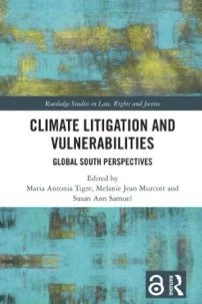Visions of Global Environmental Justice:
Comunidades Negras and the War on Drugs in Colombia
By Alexander Huezo
Focusing on the lived experiences of Afro-Colombians processing and resisting violence against their ecological communities, Visions of Global Environmental Justice employs accounts of the supernatural narratively and analytically to frame a contemporary struggle for environmental justice. The book applies Achille Mbembe’s theorization of necropolitics to the environmental racism of the US War on Drugs in Colombia, specifically the aerial eradication of coca in the comunidades negras of the Pacific Coast. Through critical examination and deconstruction of transnational mythmaking and local oral tradition, Visions of Global Environmental Justice illustrates that non/humans rendered expendable by US-driven drug (necro)politics are indispensable to both the conceptualization and the realization of environmental justice globally. Far from being a study singularly focused on the symptoms of environmental issues, this book creatively guides us toward a broader understanding of environmental racism and justice across geographic scales and non/human agencies.
Oakland, CA; University of California Press, 2025




